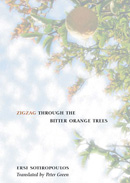

Clockroot Books, hardcover, 9781566566612
Zigzag through the Bitter Orange Trees was hailed as "the best novel of the decade" when it was published in Greece in 2000. It was the first novel to win both the Greek State Prize for Literature and the Book Critics' Award. Sotiropoulos's fifth novel, it's her first to be translated into English, although Karen Emmerich's translation of her short story collection Landscape with Dog and Other Stories was published last year (reviewed in issue 3 of Belletrista). In 2001 the novel was withdrawn from Greek school libraries for being "pornographic"; it was only reinstated recently after a campaign involving other leading Greek writers.
To pick up Zigzag is to be plunged into an initially unsettling world of changing narrators and fragmented narrative—yet I immediately wanted to know more about this world and its characters. Greek literature it may be, but this is post-modern Greek literature; no heroes here:
Sotiropoulos gives us four main characters whose narratives and lives entwine in unexpected and sometimes amusing—even farcical—ways. I could almost see the story playing out on a stage before me, each character stepping in turn into the light and then giving way to another. There's Lia, a young woman slowly dying of a strange new disease in an Athens hospital, and her wastrel brother Sid, whom Lia instructs to wreak revenge on the sadistic nurse Sotiris, who is obsessed with Nina, a twelve-year-old girl in his home village with a wonderfully fertile imagination and a precocious interest in writing. There's nothing to mark a change of narrator in the text but the four voices are so distinct that each is identifiable immediately.
The four characters dance slowly around each other, surrounded by a strong supporting cast including the fascinating Julia with her tight black trousers and love of MTV, Mama Koula the matriarch, Sotiris's unnamed father and his one saying for every occasion ("Leave sheep to the shepherds")—and of course Maria the mynah bird.
Sotiropoulos's language is by turns poignant, evocative and mordantly funny, and Peter Green's translation reads beautifully (Green says in his acknowledgement that Sotiropoulos was very closely involved in what he admits was a sometimes difficult translation, and this kind of cooperation between writer and translator can only benefit the reader). The novel is sprinkled with references to Greek mythology but it's all done in a joyful tongue-in-cheek way. My one quibble with the translation is that Green felt it necessary to explain so many of these references in footnotes, which not only left me feeling patronised but also detracted from Sotiropoulos's spontaneity at times.
Incidentally: pornographic? Hardly – but you might not want your twelve-year-old daughter reading it!
